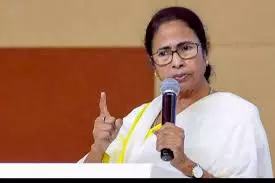
Turmoil in Bengal politics
text_fieldsWith West Bengal set to have the state assembly election – together with Kerala – within weeks from now, unprecedented political developments and shifts have been in display in the state. Despite the Trinamool Congress, which had won 211 of the 294 assembly states last time, striving hard for a third term, observers are predicting that polls can go either way. The BJP, which was far from being a material presence in Bengal, won 18 seats in the 2020 Lok Sabha election. And on the strength of such a surge, it is in a bid taking all the ammunition at its command to bring Bengal under its grasp. As a result, news flow in each day of one or the other of TMC's prominent leaders, including those close to chief minister and TMC supremo Mamata Banerjee, switching to the saffon camp. The latest in the series is Dinesh Dwivedi, former railway minister and Trinamool leader, who resigned his Rajya Sabha membership and took refuge in the BJP camp. Already, a range of leaders starting with Mukul Roy upto former minister Rajib Banerjee had deserted Mamata and held up the saffron flag. Thus the right wing alliance is optimistic that the drive led by central home minister Amit Shah and BJP national president JP Nadda, both having camped in Bengal and busy whipping up ultra-nationalist frenzy, will not fail to achieve their goal.
Trinamool Congress has been banking heavily on Muslims, who form 27 percent of the population, and act a decisive factor in 130 constituencies. The sangh parivar has been making moves in the state's electoral chess board with the hope that by framenting this Muslim vote bank, they could remove Mamata from office. It is the same tactic that the BJP had employed in UP thereby winning a significant majority and also in Lok Sabha with similar result. What happened in West Bengal in the last two elections was that Muslims, disenchanted with the crass discrimination and neglect they suffered during the three decades of Marxist rule – which the Sachar Committee had uncovered with objective data - made a rethinking and threw their lot with the Mamata combine. But what the Muslims found thereafter was a chief minister being helpless before upper caste pressures. In this scenario, a section of the community is in a quandary about what stance to take in the upcoming poll. Another section is of the view that whatever be the shortcomings of the current regime, the wise course to take is to stand by Trinamool Congress to deny an opportunity to the BJP that is openly vowed to use the Citizenship Amendment Act (CAA) to either expel Muslims in large numbers or to herd them to detention camps.
In the words of a Muslim leader, Muslims are caught between a tiger and a crocodile. Therefore, the Hyderabad based AIMIM led by Asaduddin Owaisi is making a move to convince the community that there is no use trusting the secular parties any more and to mobilise the community under its own flag and assert its standing. Owaisi is bolstered by the experience in the recent Bihar assembly election in which his party won five seats in the Seemanchal region adjacent to Bengal. But Owaisi does not wield any clout among native Bengali Muslims, and his influence is bound to be limited to the Urdu-speaking migrant segment that forms a mere ten percent of the Muslim population. And what observers are keenly watching is whether the Indian Secular Front, newly formed by religious leader Abbas Siddiqui, who had already appeared as the new spiritual saviour of the majority of Bengali-speaking Muslims, can evolve into a decisive force in the weeks that lie ahead before the election. Siddiqui's confidence is that the combined Dalit-backward-Muslim platform will become a force that cannot be ignored. Not only Asaduddin Owaisi, but even the Congress-CPM alliance are in a move to ally with him. Paradoxically, the CPM fond of the theory that the minorities organising by themselves is detrimental to them and it will only strengthen the majority communal consolidation, is used to advocating this hypothesis including in Kerala. Therefore, if the CPM, which had Muslims under its sway for decades, is now in such a pitiable state that it is forced to seek the hand of a religious leader like Abbas Siddiqui for representation, that does send its own message.
All the same, the party that will be elated by the fragmentation of Muslim votes is the BJP. It is also notable that the main propaganda plank of the BJP as well as the Congress and Left parties is the corruption and the goon culture of Trinamool party ranks during the Mamata rule. It may be true that Mamata Banerjee as an individual is one leading a simple, frugal life, and a brave leader unsullied by corruption. But that is not the perception of the people about Abhishek Banerjee, considered to be her heir. Mamata got her turn to rule, when those who had dominated the Left rule and indulged in corruption, defected to Trinamool. And now in the changed scenario, the same people are flocking to the BJP in search of power and money, playing on casteiem and armed with minority hatred. The political factors at play being so complicated, the chances of a hung house cannot be ruled out either.











